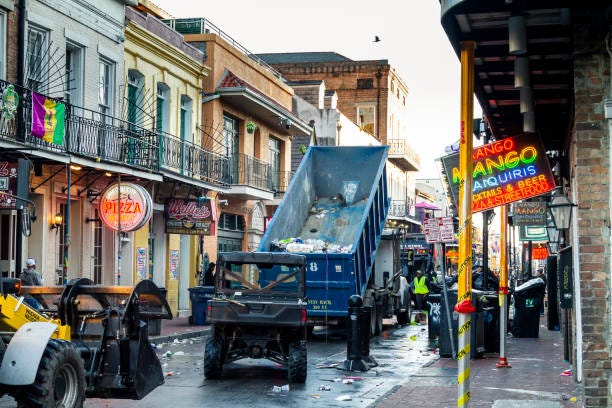
Over the past week, front pages of local news outlets have been littered with headlines covering dispute after dispute between the New Orleans City Council and Mayor Cantrell.
Although the relationship between Mayor Cantrell and the council seems to be one of constant tension, residents and businesses are also hopping into the ring to butt heads with Cantrell’s administration.
Last month, Felix’s Restaurant Owner Danny Conwill and French Quarter resident Marina Costopoulos filed a lawsuit against the city, arguing that Cantrell does not have the authority to award the contract to Henry Disposal, and explaining that termination of IV Waste would seriously diminish the quality of sanitation services in New Orleans’ most trafficked sector.
Conwill joined WWL to explain what French Quarter residents, businesses, and tourists stand to lose if IV Waste is ousted.
“She has created an emergency,” Conwill says about Mayor Cantrell, “I’ll give her that. It's going to be an emergency if IV is truly terminated and moves out of the French Quarter. We got involved because this impacts more than just these two parties (IV and Henry Consulting). You have thousands of residents and hundreds of businesses, and millions of visitors every year.”
Conwill explains the stark difference between previous sanitation services and those of IV Waste.
“The quality of service IV is riveting versus what we have had historically. It’s night and day,” Conwill says. “I have been down there in the mornings when the prior contractor was picking up garbage. They would pick up cans, but by the time they got down the block, half of what they picked up had dumped back out, leaking all kinds of horrible-looking fluids, refuse, food.”
Since IV has taken over, the place is literally spotless,” Conwill continues. “I don't think I’ve been to a city where I’ve witnessed a sanitation company doing as good as IV is doing in the French Quarter.”
The trash dispute has mostly been filtered through the lens of the City Council, which has aggressively pushed back against the mayor's decisions, even before she awarded the emergency contract to Sidney Torres and IV Waste back in December of 2024.
However, Conwill adds another dimension to the dispute, given that he has a direct financial stake in the upkeep of the French Quarter. He explains it’s not just him who wants to keep IV Waste.
“Business owners and residents are unanimous in supporting IV,” he continues. “The city council, other than Councilman Thomas, is unanimous in support of IV. There are often disagreements between state legislators…Both houses of the legislature are supportive (of IV Waste). The attorney general is supportive. The governor is a supporter… I’ve never seen any issue where the opinion is so overwhelmingly one-sided, yet the system seems to have us barrelling toward a bad result...In baseball, you would call this an unforced error.”
Next steps in the legal battle with Mayor Cantrell
While state law recently handed authority to select an emergency contractor to the French Quarter Management District, Mayor Cantrell attempted to push through a shorter contract with Hnery Consulting by declaring a state of emergency.
The council voted to override the mayor’s declaration. However, on Tuesday, a civil court judge denied a temporary restraining order filed by Conwill and Costopoulos, which still may allow a one-year $8.3 million contract with Troy Henry to move forward.
Now, the court has set a preliminary injunction date for July 23rd, where Conwill will make a case that Cantrell’s push for a Troy Henry contract does not fall under her sole authority. Judge Cates, the same judge who denied Conwill’s restraining order, could choose to stop the temporary contract at this point.
Conwill expresses his distaste for the structure of Henry Consulting's business model and contract as it stands, given that they’re merely a facilitator that strings together subcontractors, rather than a primary owner and employer of sanitation equipment and workers.
“On the cost side of it. It’s pretty simple logic. If you have someone in the chain of contract that is not adding any visible service, you’re either going to be paying more for the same service or you’re going to be getting less because there’s money coming out of the system that is not going directly into the service,” Conwill states.
“As I understand it, whoever it is Mr. Henry is contracting, they’re a consulting firm too, and they don't have any equipment," Conwill continues. "And the ultimate provider of the service is an equipment rental company. So you're going to go rent a bunch of stuff from somebody and then go grab a bunch of people off the street to operate it. At least when Richards was involved, you saw some semblance of a real company. Here, I can't get to the bottom of it. I don't see a real company anywhere.”
"It doesn’t say a lot about your city if you have to litigate to get your trash picked up,” Conwill concludes.


